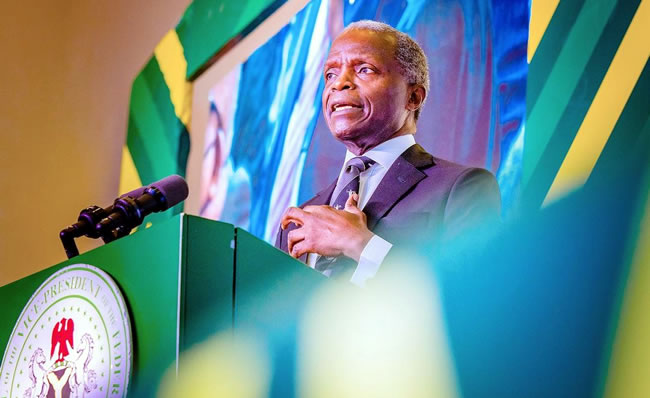As Nigerian workers join their counterparts across the world to celebrate workers’ day, the President of the Federal Republic of Nigeria, the President of the Senate and the Speaker of the House of Representatives, Muhammadu Buhari, Ahmed Lawan and Femi Agbajabiamila, respectively, have once again distanced themselves from the workers in the auspicious day.
Addressing workers however, Vice President Yemi Osinbajo, reeled out many achievements of the All Progressive Congress (APC)-led party government in the past seven years and promised a consolidation on the successes of the administration.
Osinbajo mentioned that Buhari administration has among many other things, increased teachers’ retirement age, engaged over four million Nigerian youths in quasi employment through N-POWER and other programmes, healthcare insurance scheme, enacted Not-Too-Young-To-Run law, and others.
He noted that regardless of many challenges faced by the Buhari-led government, the administration is steadfast in tackling issues that directly affects workers’ welfare and wellbeing.
Furthermore, he listed national minimum wage and establishment of over one million micro and small businesses, upward review in salaries and wages of men and women in the Nigeria Police Force as part of President Buhari government’s broader commitment to safeguarding the country and improving the living conditions of the citizens.
The question of what sort of politics can deliver good governance and development is decisively answered by progressive politics. As a progressive, I believe that good governance and development mean compulsory free education for the unlettered, universal healthcare coverage, inclusion for the alienated, social mobility for the poor, justice for the wronged and social security for the vulnerable. The progressive vision of Nigeria is of a nation in which the relations between the government and the governed is defined by a social covenant. It is of a society in which no Nigerian is left behind. It is of a canopy of inclusive and broad-based prosperity in which the security and the welfare of each citizen is guaranteed.
“This administration has embarked upon the most ambitious programme of social protection in sub-Saharan Africa. We are catering for our children through the Home Grown School Feeding Programme which feeds 9.5 million children daily and for our unemployed youth through programmes such as the N-Power scheme. Over 4 million people have benefitted from the Government Empowerment and Enterprise Programme (GEEP), and other support initiatives under the National Social Investment Programme.
We established the National Commission for Persons with Disabilities and the National Centre for Senior Citizens to cater for the needs of our compatriots that live with disabilities and our elders. This is a demonstration of our commitment to inclusion, especially of groups that have long been relegated to the margins.
“In the realm of politics, the enactment of the Not to Young to Run Act which modifies the age restrictions for seeking public office not only opens doors of opportunity for more youth engagement in politics; it is a further demonstration of our commitment to inclusion in all its ramifications.
“As we battled to contain the spread of the corona virus here in Nigeria, almost all economic activity was grounded. But we understood the dangers that portended to our citizens and to our general economy. That is why during the pandemic, the Federal Government placed Micro, Small and Medium Scale Enterprises (MSME) employees on payroll support to get them through the period, as part of its Economic Sustainability Plan. We introduced the food for jobs agricultural programme. Providing support for over 4 million farmers. We started the most ambitious social housing programme in our nations history , 300,000 homes at N2m. As part of the same Economic Sustainability Plan we started the solar Naija programme to connect 5million homes with solar power.
